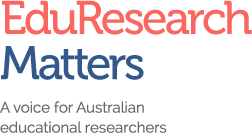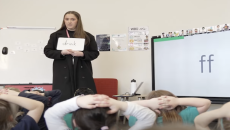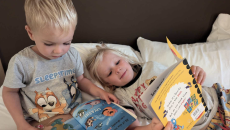At last year’s AARE conference, a friend texted me and asked: “Are you free atm? I’m so upset.” We caught up, and she explained that she had been in a session on teacher education reforms (yes, TEEP) when a small number of commenters in the room started loudly jeering phonics research.
What’s the problem?
First, she’s an expert in this space. She completed her PhD with one of the leading reading researchers internationally, and she conducts careful and well-designed studies that investigate the cognitive processes involved in reading acquisition. She felt incredibly unwelcome.
Second, we’re an evidence-based profession. There is a strong body of evidence that learning phonics systematically supports beginning readers. No, it’s certainly not everything – let’s put that strawman aside. But it matters. We know this in education.
It’s tempting to see my friend’s experience as a one-off. But those of us who conduct research in cognitive and educational psychology will see it as part of a small but uncomfortable pattern. A vocal minority have linked our work with eugenics, Nazism, hyper-capitalism, totalitarianism and more. We are ‘boosters’ with agendas who want to make children suffer via robotic drill and kill. Nothing could be further from the truth.
Education is a broad church
Education is inherently interdisciplinary. Educational psychology, cognitive science, and neuroscience tell us about the mechanisms of learning and development and how we can use this knowledge to support learners. Then, educational philosophy informs our understanding of what education is for and the nature of evidence itself. And educational history helps us understand what we have done before and why, while sociology informs our understanding of social contexts and their influence on children’s educational attainment and experiences. These foundation pillars enable us to act with purpose, to ensure our practices are aligned with what we know about learning and development, and to connect these understandings with goals we consider important in society.
In educational psychology subjects I have designed, we have taught ITE students about memory and cognition, attention, higher order thinking, motivation and engagement, self-regulation and metacognition, emotional health and wellbeing, and social relationships. Each of these has different developmental precedents and pedagogical implications: some cutting across academic disciplines, and others specific to individual disciplinary structures and goals.
The battle for space and depth
Given the volume of these topics, I would love the space to go into greater depth again with my students. Yet a perennial challenge in ITE is the relatively limited space for general education studies. AITSL’s Program Accreditation Standards and Procedures rightly demand substantial space for discipline studies and professional experience, meaning we must make tough curriculum choices.
Those inside and outside university walls may disagree with me regarding questions of volume, and I am always happy to have those conversations – recognising, of course, that we have shared goals in wanting the best for teachers and their students. What should not happen, however, are personal attacks on those of us who do psychological research that call into question our character, political orientation, or care for students and their learning.
We need to raise the bar.
A need for civility in educational discourse
I was recently drawn to an editorial and corresponding letters regarding purpose, humility, civility and science. Interestingly, this wasn’t about education. It related to disagreements within psychiatry regarding medication and mental health and was published in the Lancet in 2018. Central were calls for clear eyed assessments of evidence to be complemented with professional respect, civility, and recognition of common goals in wanting patients to recover fully and well.
Sometimes within education, disagreements about evidence are about interpretation, quality, or generalisability. Very often, they are not about the original research itself but about what it means and what we do with it. When we move from point-scoring to civility, it becomes possible to identify what we all agree on. Learning styles are a myth. Working memory is limited. Multitasking isn’t possible. These are entirely uncontroversial and supported by decades of research.
We can then identify where specific evidence might be unsettled, where application has been overgeneralised, or where we simply don’t have enough evidence yet. Yes, explicit teaching has a robust evidence base. It is particularly good for supporting novice learners to build new knowledge. No, it’s not the right tool for every learning outcome. We want to ask about expertise, about disciplinary goals, and purpose. This doesn’t mean choose your own adventure: on the contrary, it means incisive assessment of what is needed when, for how long, and why.
In research I conducted with the NSW Council of Deans of Education while Head of School at Wollongong, we mapped stakeholder responses to each of the TEEP reform areas. We found strong agreement across higher education providers, employers, and teachers’ associations regarding the importance of psychological insights, alongside other things teachers must know.
A positive turn
While I have painted a gloomy picture, we are fortunate that broadscale disdain for psychology in education is not the norm. The vast majority in our profession welcome evidence and knowledge-building from educational psychology and cognitive science, as they do evidence and insights from other informing disciplines. Moreover, we have the structures to prove it.
Wollongong hosts the multimillion dollar Early Start institute, with members from education, psychology, and health sciences collaborating to bring research-informed understanding of children and their development to the community. Within ACU’s Faculty of Education and Arts there is the excellent Centre for the Advancement of Australian Literacy and associated Literacy Clinic, the Institute for Positive Psychology and Education, and the Institute for Learning Sciences and Teacher Education. La Trobe’s School of Education hosts the Science of Language and Reading (SOLAR) lab, while the University of Melbourne’s Faculty of Education hosts the Centre for Wellbeing Science. UNSW, long a powerhouse in learning and cognition, frequently hosts inter-institutional Educational Psychology Roundtables. At my own institution, Macquarie, we are developing a new incubator integrating learning sciences and education.
We must engage in good faith
Education has long been criticised externally. Some criticisms are valid, even if we might disagree with them. As public institutions we should engage with them in good faith. Some are misinformed or intentionally insulting. We do our colleagues a disservice if we allow similar incivility within the profession.
Ultimately, debates about evidence in education should be about the children in our classrooms. When we allow ad hominem attacks from within to replace scholarly discourse, we risk closing off inquiry that could genuinely help young learners.

Penny Van Bergen is an associate professor, psychology in education, in the School of Education, Macquarie University. She is former head of school and honorary professor at the University of Wollongong. She is a Senior Fellow of the Higher Education Academy and has won awards from the Australian Government, Unijobs, and Australian Psychological Society for her embedding of psychological knowledge in education.








If you have people determined to disrupt a discussion, then a call for civility is not going to work. Someone who can’t observe the rules of the forum needs to be thrown out.
Hi Tom,
I think norms and cultures do shape behaviours. Making those explicit can only help, especially when I have no power to throw anyone out.
– Penny
In strong support of “civility … in discourse”: without that, principles of scientific enquiry are countered, public debate is skewed, and public participation in debate is discouraged.
What’s the problem? Expertise”? “Evidence? “Structures which prove [and protect]?”
“Politics”, as my PhD Supervisor (Emeritus Professor Allan McConnell) pointed out on Twitter, “will trump ‘evidence’ any day of the week”.
Politics has something to do with lack of civility, and the ATM is interconnected with politics. Follow the money. Who benefits? Who loses?
I too, am upset atm about the lack of civility in discourse. How broad are your shoulders Penny?
Hi Wendy,
I agree, there’s always politics – and power. I’m not sure we can do away with that completely, but I’m hoping in flushing it out that we might get better at resisting the worst of it.
I was head of school for a little while recently, so I *think* I have broad enough shoulders – but it depends on the load of course. I was nervous before hitting ‘publish’!
– Penny
Thank you, Penny. I feel for your colleague, but I do enjoy the subject of phonics and evidence. In my view — and I say this in the spirit of building a bridge — I am always cautious about statements that begin with “we know”. The central issue is not which “angle” one takes on phonics or any other approach, but how that angle constructs the student. What is a student? An object to be managed, or a subject to be encountered? The problem is not generalisability but epistemology; not simply interpretation, but the stance we take toward the student and their learning, and how we justify it. What concepts are shaping the very evidence we cite? And are those concepts echoed across other disciplines, or only within our own? It is never the data alone that matter, but the assumptions that bring that data into being.
Ania Lian
Ania, “It is never the data alone that matter, but the assumptions that bring that data into being.” Exactly!
Also funding. Funding enables some researchers to provide data, and precludes others. Several scholars told me during my PhD research that ‘We can’t get the funding’ for our research because “Ophthalmologists poo poo it”! They are probably still upset about that.
Hi Ania,
Thanks for your thoughtful response. I hear what you’re saying re knowledge, although I think we’re coming at things differently.
I feel comfortable saying ‘we know’ if there seems to be robust enough evidence within a given context, and esp if it seems agreed on by those with diverse expertise. Without any shared sense of what is known we end up unable to move fwd.
If there’s substantial debate I’d want to frame it along those lines instead, since it clearly isn’t agreed (even if I might think the evidence is clear). Maybe I’ve misunderstood particular criticisms here re phonics though?
I agree fully in terms of epistemology driving how we frame and read evidence, and the need to interrogate our own assumptions.
– Penny
Thanks Wendy. Yes it’s a concern. How does one construct evidence contrary to phonics? Phonics research is simple: 12 weeks of drills and voila. What if your approach requires a more complex set of steps, not so single focused ? Will the ,ophthalmologists approve it? Myself I’m still stuck on the question how Sweller et al. identity chunks. I think that the process should be disseminated through neuroscience publications as evidence of how the brain processes maths, literacy etc. Interesting times indeed